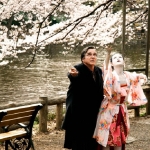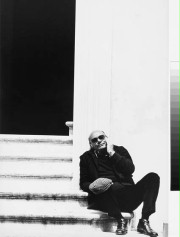Ok, .. Berlinale is on .. and finally I am looking that far out that I at least get some glimpses of the whole spectacle. Sure the newspapers were full of The Stones visit, Patti Smith planing to visit Brecht’s grave and just yesterday Madonna’s appearance made the actual players of the event – the films – vanish into the background. But there is reason to look a little bit closer.
| Seemingly it is the more silent films, which are worth to attract the real attention, which play out there power in the background while the foreground figures distract with glamour and noise. | |
| Among them is the italian film ‘Chaos calmo‘ (trailer) and astonishingly even a german film called ‘Hanami’ by Doris Dörrie. I am not a fan of her usually and especially cautious when Europeans start to project their fantasies on Japan. But seemingly – as far as to tell from the trailer – she seemed to have managed quite well to balance along the borderline between ‘kitsch’ and ‘clichée’. >>> watch trailer at YouTube |  |
Another reason to watch out at the this year’s event is surely the honoring of the award winning, and highly political italian filmmaker Francesco Rossi. (Please look at the Alternative Film Guide Blog for a good and concise overview of Rosi’s work).
| … When Francesco Rosi made his directorial debut with La sfida (The Challenge) in 1958, he had already had years of experience as assistant director and screenwriter for several filmmakers, including Visconti. Neorealism defined his use of original locations and non-professional actors. In I magliari (1959, The Magliari) he drafted a realistic picture of rivalling Italian cloth salesmen in Hamburg, who were trying to make a place for themselves in the affluent West German society. In Salvatore Giuliano, Il caso Mattei (1971/72, The |  |
| Mattei Affair, which won the Palme d’Or in Cannes) and Lucky Luciano (1972/73), he explored how economic and political power structures were intertwined with the Mafia. Set in his hometown of Naples, he exposed hushed-up building scandals in Le mani sulla città (1963, Hands Over the City), for which he received the Golden Lion in Venice. In the late 1970s, Francesco Rosi broke new ground, both aesthetically and thematically. In Cristo si è fermato a Eboli (1978/79, Christ Stopped at Eboli) and Tre fratelli (1980/81 Three Brothers), Rosi turned his attention to the inner lives of his characters. These films also mirrored the conflicts between Italy’s rich north and its poorer agricultural south – the latter presented in the archaically poetic landscape of Lucania in Cristo si è fermato a Eboli. … (excerpted from Berlinale website) |
|
